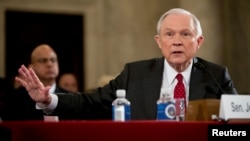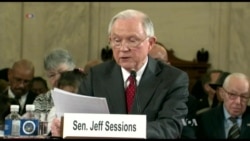President-elect Donald Trump's choice to be attorney general, the top U.S. law-enforcement officer, told U.S. senators examining his qualifications for the office that he would stand up to the president on issues where they disagree, and that he would follow the law at all times.
Senator Jeff Sessions of Alabama, one of the most conservative members of the upper chamber of Congress, testified Tuesday that he would swallow his own disagreements and follow rulings that have already become "settled law" in the United States, such as women's right to abortion.
Here are some of the issues discussed during Sessions' eight-hour appearance on Capitol Hill:
Abortion rights 'law of the land'
Asked about his own comments in the past denouncing the Supreme Court's 1973 ruling on abortion rights as "one of the worst, colossally erroneous" decisions ever by the high court, Sessions said: "It is. I believe that it violated the Constitution and really attempted to set policy and not follow law."
However, he added, "It is the law of the land. It has been so settled and established for quite a long time. And it deserves respect, and I would respect and follow it."
Similarly, Sessions said he would enforce a law forbidding as torture the interrogation technique known as waterboarding, even though he voted against the law before it was passed.
Opposes torture, but will fight against terrorism
The 70-year-old senator promised he would prosecute illegal immigration, gun violence and "radical Islamic terrorism" once in office. But he also said he would not support banning Muslims or any other group from the United States on the basis of religion - an idea that Trump proposed months before the U.S. election, then later backed away from.
Sessions strongly rejected accusations that he formerly professed racist views as "damnably false charges," and said any suggestion that he once was sympathetic toward the violent white-supremacist group the Ku Klux Klan was false.
"I abhor the Klan and what it represents and its hateful ideology," the Alabama senator said.
Rejects 'race-based ideas'
Protests marred the confirmation hearing Tuesday on several occasions, including when two men dressed in a version of the KKK's all-white robes stood and disrupted the proceedings.
Racially charged comments Sessions reputedly made during the 1980s, when he was a U.S. prosecutor, derailed Sessions' nomination for a federal judgeship. He reiterated this week that he was innocent of such beliefs: "I did not harbor the kind of animosity and race-based ideas that I was accused of. I did not."
Sessions said he is the same person now that he was three decades ago, but perhaps a little wiser.







